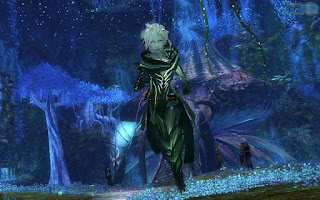Learning to love 'Guild Wars 2' as an MMO newcomer
By Isaac Handelman
Note: this article of mine was originally published on the Spokesman Review's Tech Deck blog. The original post can be found here: http://www.spokesman.com/blogs/tech-deck/2015/jan/16/learning-appreciate-guild-wars-2-mmo-newcomer/
Note: this article of mine was originally published on the Spokesman Review's Tech Deck blog. The original post can be found here: http://www.spokesman.com/blogs/tech-deck/2015/jan/16/learning-appreciate-guild-wars-2-mmo-newcomer/
I am not an MMO player.
That is, unless you count my time in sixth grade spent hopping onto a friend's World of Warcraft account for a few trial sessions. Perhaps fortunately, my burgeoning addiction to that title was harshly counteracted by the daunting $15-a-month paywall.
Having now been primarily a PC gamer for upwards of two years, I decided that I was long past due to give some attention to one of PC gaming's darling genres. As it just so happened, Amazon's $20 holiday price point for the subscription-fee-less Guild Wars 2 fit the bill for an acclaimed, economically accessible MMO and I, along with two friends, jumped on the offer.
Following a lengthy, comfortable period of character creation during which I selected an elf-like "Sylvari" as my avatar, my first minutes with the game bred skepticism. Single-player fantasy RPGs like Skyrim taught me to expect tight controls and total freedom of movement in my games, ideals that the default mouse-button-mapped directional controls and A/D key camera rotation clashed with. A few minutes of control customization granted me the ability to move my character where I intended, but the strange lack of feedback associated with collision detection made my early combat encounters with nightmare hounds dull affairs.
If not for the pull of my friends' goofy in-game jumping and "/dance" commands, my time with Guild Wars 2, and my evaluation of the entire MMO genre, would likely have ended there. Luckily, I endured the pains of the genre transition and continued on my quest through Caledon Forest.
Soon enough, early signs of my rash judgment began to emerge. As several other human players bustled around me, I opened my map and zoomed out, catching my first glimpse of Tyria. The sheer size of the world immediately astounded me. I noted how large the starting area seemed, and yet how small a fraction of the entire game world it actually encompassed.
Skyrim, for all its vast landscapes, rich lore, abundance of quests, and myriad of NPC companions, always made me feel like my character was the main attraction of the world -- after all, he was the chosen one, and the world's goings-on seemed to revolve around my actions. But within a span of minutes, Guild Wars 2 succeeded in making me feel like a mere inhabitant of a much larger world.
Some may argue that such a feeling contradicts all that's fun about video games. They'd say that, in games, they don't want to feel like a single inhabitant of a larger world, because that's what they are in real life. And after all, games are a way to escape reality, not to emulate it, right?
In response to that, I'd simply say that real life typically forgoes allowing me to whack giant spiders on the head with leaping warhammer attacks, and Guild Wars 2 doesn't. Though the impreciseness of combat annoyed me at first, my reflexes began to adapt and I found myself soon executing enjoyable attack strings and developing strategies and patterns of skill use. My fingers learned to reach for the far-away number keys to activate my hotbar skills, and encounters gradually became more and more engaging as my keyboard dexterity improved.
My time spent leveling from one to five was endured mostly through the amusement of playing with friends -- a novelty that's not allowed in such a capacity in most other genres.
But as my time with the game increased from immeasurably minuscule to measurably minuscule, I started to enjoy a wider variety of its features. While gallivanting around Caledon Forest in search of a hilariously clunky platforming puzzle, I noticed another player in combat with a pack of wild beasts. A similar situation in a single-player RPG would have likely resulted in my ignoring the struggling NPC, but the fact that a real person sat somewhere controlling that avatar drove me to intervene in the conflict.
Similarly, when I reached my destination, the platforming challenge was tackled not just by me and my friend, but also by a group of imposing Charr warriors intermixed with a pair of dwarfish Asura. Though their party looked vastly more experienced than ours, we cooperated to climb a series of precariously-placed mushroom platforms. At one particularly difficult jump, the entire group failed repeatedly and plunged to the dark depths below. Each player would take a turn giving the leap a try -- until, at long last, one player discovered the secret to landing the jump, and the entire party followed joyously behind to claim the chest that lay above as a reward.
Simple moments of emergent cooperation like these convinced me that value is held in the social interactions of an MMO. While the always-online nature of the genre might not always enhance its core mechanics, Guild Wars 2 provides gaming value in a different form.
Guild Wars 2 (and I'd hypothesize most MMOs) is a way to escape reality not through a power fantasy, but through the ability to socially inhabit a conventionally structured world in an unconventional way. Sure, an MMO's world may not be "conventional" in a material sense, but it is similar, in terms of basic structure, to the real world; it's a huge, varied landscape inhabited by real people who all do different things, and whose levels of importance are not determined by predestination, but by their contributions to the world itself -- and, by extension, what they take away from the world as rewards.
Such is my hypothesis on the appeal of the MMO based on the brief time that I've spent with Guild Wars 2 thus far. This is the reason why I -- and all MMO players -- learn to overlook the floaty mechanics in exchange for the sense of inhabitancy that the genre provides. And Guild Wars 2's world is one that I look forward to inhabiting long into the future.




Comments
Post a Comment